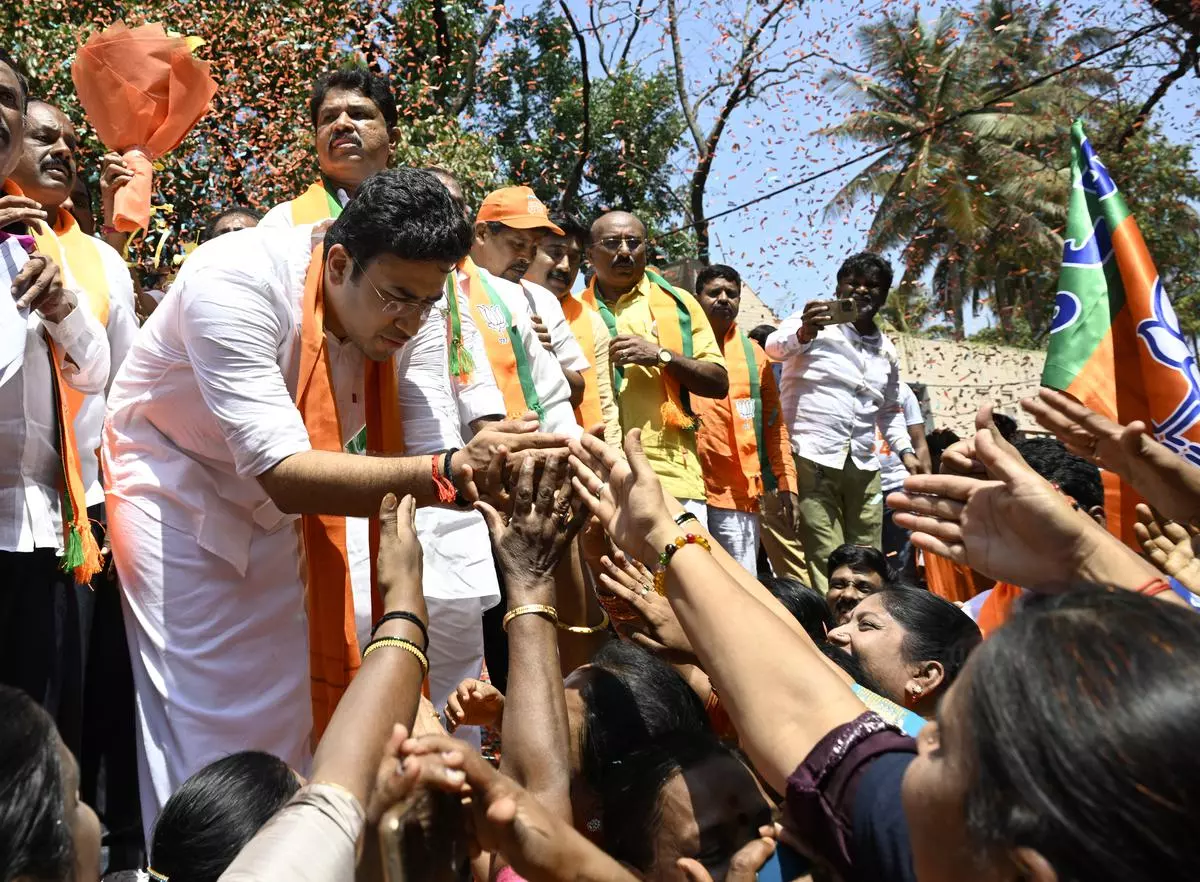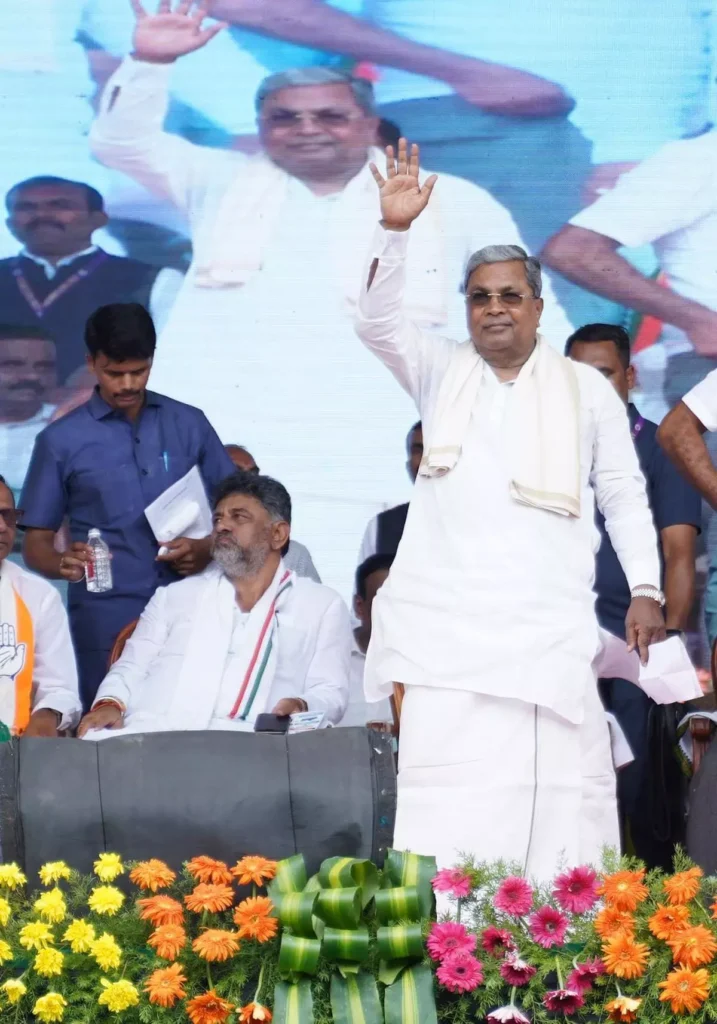The BJP, which won 11 of the 14 seats in 2019, may find it difficult to repeat the performance.
A tough and direct fight is slated to take place between the Congress and the BJP-JD (S) alliance in south Karnataka in the second phase of voting for the Lok Sabha election slated for April 26. Of the 28 seats in Karnataka, 14 go the polls across the hinterland of south Karnataka, from the coastal districts of Dakshina Kannada and Udupi to Kolar in the south-eastern part of the State.
In the 2019 Lok Sabha election, the BJP won 11 of the 14 seats, while the Congress and the JD (S), which were in an alliance, won a seat apiece. An independent candidate, who subsequently joined the BJP, won the Mandya seat.
Field reports from these constituencies show that there is a neck-to-neck fight in all the 14 constituencies and it will be difficult for the BJP to repeat its impressive performance this time around even though the JD (S) has joined hands with it.
Who’s fighting who in south Karnataka
A full list of the constituencies voting on April 26 in Karnataka with brief details about the candidates follows:
https://buy.tinypass.com/checkout/template/cacheableShow?aid=7JJs2o4rpu&templateId=OTBUKU7PTEAT&offerId=fakeOfferId&experienceId=EX4BTGPJLJ43&iframeId=offer_02e3be32d320cc7bd1b1-0&displayMode=inline&pianoIdUrl=https%3A%2F%2Fid.tinypass.com%2Fid%2F&widget=template&url=https%3A%2F%2Ffrontline.thehindu.com
Udupi-Chikkamagaluru: The constituency extends from the Udupi in coastal Karnataka to the hilly region of Chikkamagaluru and in terms of representation of current MLAs, is cleaved cleanly, with the BJP dominating the coastal region and the Congress exercising control over the hills. The disparate geographical nature of the constituency means that the concerns of the electorate vary across the region. The BJP’s candidate is Kota Srinivas Poojary, a Billava, while the Congress’ K. Jayaprakash Hegde is a Vokkaliga. While Poojary is a faithful worker of the BJP who has also served as a Minister, Hegde, who in his most recent stint served as the chairman of the Karnataka State Backward Classes Commission, is notorious for his party-hopping and was in the Janata Dal and the BJP in the past.
Hassan: Even while suffering a severe dent in vote share in last year’s Assembly election, the JD (S) managed to prevail in four of the eight segments of this constituency. Hassan is one among the three seats allocated for the party as part of its alliance with the BJP and is considered the bastion of the JD (S) as H.D. Deve Gowda, the patriarch of the Vokkaliga community, belongs to this region. The party’s candidate is Prajwal Revanna, Deve Gowda’s grandson, who won this seat in 2019. The Congress candidate is Shreyas M. Patel, grandson of former parliamentarian D.J. Puttaswamy Gowda. The contest is being seen as the third-generation battle between these two families as Puttaswamy Gowda had defeated Deve Gowda in the 1999 Lok Sabha election.
Dakshina Kannada: This constituency scores highly on development indices but is also, ironically, famous for being the laboratory of Hindutva in Karnataka. With the deep anchoring of Hindutva politics, the BJP has won this seat since 1991. Even the composition of the MLAs is an advantage for the BJP as seven of the eight legislators belong to the saffron party. Both the main candidates in the fray, the Congress’ Padmaraj R. Poojary and the BJP’s Captain Brijesh Chowta, are newcomers. The Congress has mounted a spirited campaign here and has astutely chosen a Billava candidate against the BJP’s Bunt candidate. The Congress’ calculation is that if Billava support is added to that of its traditional support base among Muslims and Christians, it may just be enough to see it through.
Also Read | ‘The BJP has not learnt its lesson’: Priyank Kharge
Chitradurga: Both the leading candidates in this reserved constituency (SC), the Congress’ B.N. Chandrappa and the BJP’s Govind Karjol, belong to the left-hand or the Madiga agglomeration of Dalits. Of the eight Assembly constituencies here, seven are represented by Congress MLAs although Karjol balances this disadvantage with his administrative experience and political seniority as he was a Deputy Chief Minister in the past. Chitradurga is largely a rural constituency and the paucity of markets is causing severe problems among onion, tomato, and silk farmers.
Tumakuru: This constituency is unique in Karnataka as both Lingayats and Vokkaligas are present in good numbers and it will witness a direct fight between candidates belonging to the two dominant castes of Karnataka. While the BJP has nominated former Minister V. Somanna, a Lingayat, the Congress has nominated former parliamentarian S.P. Muddahunamegowda, a Vokkaliga, who returned to the Congress’ fold from the BJP only in February this year. In 2019, former Prime Minister Deve Gowda, who was the Congress-JD (S) alliance candidate, was defeated in the Narendra Modi wave that swept the nation. While the Congress has four MLAs in this constituency, the BJP and JD (S) have two each.
Mandya: Considered the power centre of Vokkaliga politics in Karnataka and the heartland of the Deve Gowda clan, Mandya is one of the three seats that has been allotted to the JD (S). Party president and former Chief Minister H.D. Kumaraswamy is pitted against the Congress’ Venkataramane Gowda, a contractor who has drawn attention as the richest candidate from Karnataka in this Lok Sabha election. The stakes of this contest are high, especially for Kumaraswamy, as his party suffered a historic rout in the 2023 Assembly election. Even in Mandya, out of the eight Assembly constituencies, the JD (S) managed to win only two seats.
Mysuru: Apart from incorporating the urban and rural hinterland of the historic city of Mysuru, this seat also includes two constituencies of Kodagu. The BJP has dropped its sitting MP, Pratap Simha, and nominated the 32-year-old scion of the Mysore royal family, Yaduveer Krishnadatta Chamaraja Wodeyar, and is hoping that his youthful image and ancestral legacy will provide the goodwill necessary for victory. The Congress candidate, M. Lakshman, is a Vokkaliga, who is pitching his candidature as the fight of the “common man”. Siddaramaiah’s home district is Mysuru and the Chief Minister has taken up this battle as a personal fight for prestige.
Chamarajanagar: Considering that Varuna, the Assembly seat of Siddaramaiah, is part of this parliamentary constituency, the Chief Minister has taken it upon himself to win this seat for the Congress. The incumbent BJP MP, Srinivas Prasad, was a former Congressman who left the party because of his well-known differences with Siddaramaiah. For long, a cold war existed between the two veteran politicians, but Siddaramaiah met Prasad after the latter made it clear that he would not contest this election. The Congress has nominated Sunil Bose, son of H.C. Mahadevappa, a Minister in the Karnataka Cabinet, while the BJP has chosen former Kollegal MLA S. Balaraj. The Congress’ winning run in this constituency, reserved for SC candidates, was broken for the first time by Prasad, who won this seat in 2019.
Bengaluru Rural: This constituency is spread across urban segments as well as the rural hinterland around Bengaluru, with development varying across two different parts of the constituency. Considered a fortress of the Congress, where D.K. Suresh, the brother of Deputy Chief Minister D.K. Shivakumar, has scored a hat-trick, the BJP is trying its luck with Dr C.N. Manjunath, a well-known cardiologist who is also Deve Gowda’s son-in-law. The constituency is crucial as it has become the battleground between the two families and victory here could also temporarily settle the question of whether the mantle of the Vokkaliga leadership has convincingly passed on to Shivakumar.
Bengaluru North: With almost 32 lakh voters, Bengaluru North has the largest electorate among the Lok Sabha constituencies of Karnataka. The BJP has been successful in this constituency since 2004 but has chosen to field an outsider, Union Minister Shobha Karandlaje. Karandlaje was keen on being renominated from her home constituency of Udupi-Chikkamagaluru but party cadre there resisted her candidature, forcing the BJP to accommodate her in Bengaluru North. The Congress has picked M.V. Rajeev Gowda, a former Rajya Sabha member who is trying hard to shed his image of a soft-spoken scholar. Both the candidates are Vokkaligas, which is not surprising, since members of that caste constitute the largest voter base here, but the seat is also home to substantial Muslim and Dalit populations.
Bengaluru Central: The BJP’s P.C. Mohan has been successful in all the three elections that have taken place in this urban constituency, which was formed in 2009. The Congress’ candidate, Mansoor Ali Khan, is the son of former Union Minister K. Rahman Khan. This is the only seat where the Congress has nominated a Muslim in Karnataka. Interestingly, the Congress fielded a person from among religious minorities in the past three elections, but none of them tasted success, although the margin of Mohan’s victory was lower in 2019. The demographic profile is cosmopolitan, with a substantial number of Muslims and Christians being part of the electorate. Of the eight legislators from the constituency, five belong to the Congress while three belong to the BJP.

Tejasvi Surya, the Bengaluru South BJP candidate, at a rally before filing his nomination papers, in Bengaluru on March 3. | Photo Credit: K. BHAGYA PRAKASH
Also Read | ‘Electoral democracy is not an even playing field in India today’: Krishna Byre Gowda
Bengaluru South: This is considered as one of the safest seats for the BJP in the country as the party has continuously won since 1991. Former Union Minister Ananth Kumar was responsible for this winning streak until his death in 2018. In 2019, Tejasvi Surya, the young and aggressive Hindutva votary, retained this seat for the BJP. Both Kumar and Surya are Brahmins, who form a substantial portion of the electorate in the seat. The Congress’ candidate is Sowmya Reddy, who narrowly lost in last year’s Assembly election. She is the daughter of senior Congress leader and incumbent Minister Ramalinga Reddy.
Chikkaballapur: The constituency was considered a safe bet for the Congress but the BJP sprung a surprise in 2019 by winning it for the first time. With its party MP retiring from active politics, the BJP has nominated Dr K. Sudhakar, a Vokkaliga, who was one of the Congress MLAs who deserted the party in 2019, leading to the fall of the Congress-JD (S) coalition government. The Congress has nominated Raksha Ramaiah, a youth leader and son of a Congress MLC, whose candidature was supported by both Siddaramaiah and Shivakumar. Of the eight MLAs in the constituency, five belong to the Congress and two to the BJP, while one is an independent.
Kolar: The constituency is one of the three allotted to the JD (S) and is reserved for SC candidates. The sitting BJP MP relinquished this seat for the JD (S) candidate, Mallesh Babu, while the Congress finally decided on an outsider, K.V. Gowtham, as its candidate, after failing to pick a local candidate from among the severely factionalised party leadership in the constituency. While the largest chunk of the electorate in this constituency consists of Dalits, there are substantial numbers of Kurubas and Muslims as well, which means that the votes of AHINDA, the agglomeration of Dalits, backward castes and minorities, assiduously cultivated by Siddaramaiah, will be decisive.

